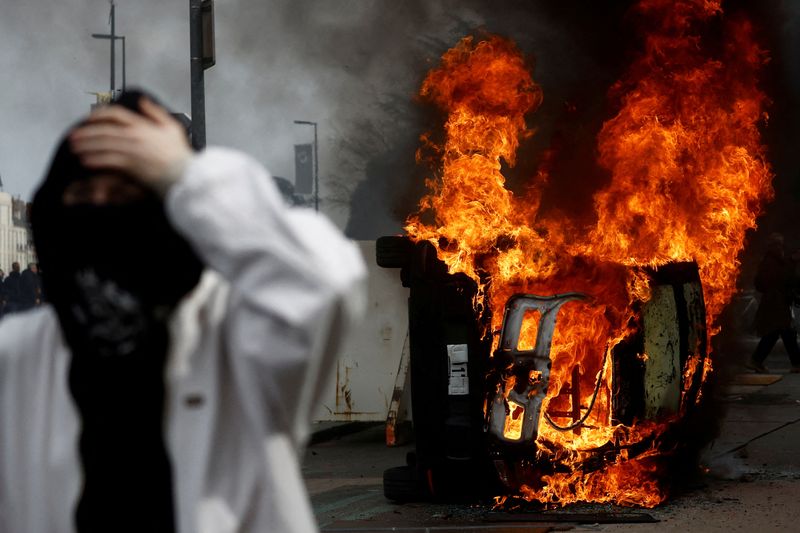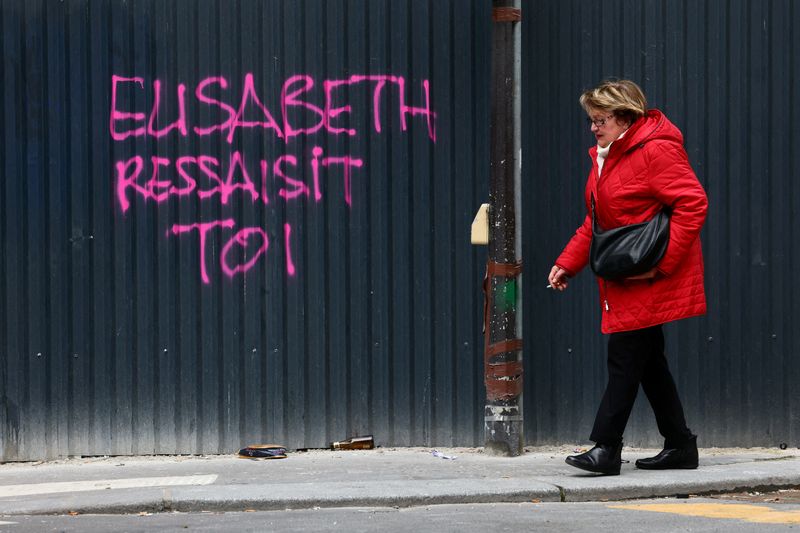By Elizabeth Pineau
PARIS (Reuters) -President Emmanuel Macron's drive to ram through legislation raising France's retirement age despite mass protests is creating rifts between ministers and his allies amid frustration that the government has not resolved the standoff, insiders say.
Ministers and lawmakers are trading blame for the failure to build broader support for Macron's flagship policy, and some members of his own party are uneasy with his move to use executive powers to push the bill through parliament.
Polls suggesting voters want a cabinet reshuffle are putting further pressure on Prime Minister Elisabeth Borne, with some of her colleagues likely to be eyeing to take her place should she be forced to resign over her government's handling of the crisis.
What started out in January as a union-led protest against Macron's plans to raise the retirement age by two years to 64 has spiralled into a broader movement with mass demonstrations held across France that frequently turn violent.
No minister has publicly broken rank on the pensions reform or the government's approach to its delivery, but sources close to Macron's camp say that behind the scenes government officials and lawmakers are engaged in a damaging blame-game and infighting as some no longer bother to hide frustrations.
With no sign of the protests abating, insiders question whether Borne's government has lost control of the political messaging necessary to appease the street.
"We've got two or three days to get control of the messaging again and get everybody back on the same page," one government source said.
The situation has deteriorated considerably since Macron decided on March 16 to adopt the reform using special constitutional powers to bypass parliament.
While fiercely criticised by oppositions parties as undemocratic, the move has also sat uneasily with some lawmakers in Macron's Renaissance party and its allies, after some of them have seen protesters vandalise their offices in their constituencies.
When asked about the divisions, the president's office said the majority of Macron's camp remained strong and united.
Meanwhile protesters are increasingly turning their wrath on Macron for chipping away at what they see as a cherished cornerstone of France's social contract, if banners waved in demos on Tuesday are anything to go by.
Some at protests in Paris read "Should we cut off his head? Yes - Maybe" and "Thanks Macron for sparking the flame of revolution".
Not even a year into his second five-year term, Macron has failed to shake off his image among voters as an aloof CEO of a rarefied elite deaf to the common people's concerns.
In a poll published on Thursday, 76% of those surveyed said that the pension reform episode had left them with a bad opinion of Macron, and nearly two thirds want a reshuffle.
IN THE HOT SEAT
Macron sought to turn the page on the pension crisis with a TV interview last week in which he refused to back down. Although this further outraged protesters, a second government source said it was an effort to move on and some ministers should follow the president's example.
"There are still ministers who are saying 'we should have done this or that', No!," the source lamented. "They need to carpet-bomb on their patch and push new subjects that eclipse the pension reform."
An official in Borne's office said the prime minister had made efforts to preserve unity among ministers and lawmakers.
"Are there lawmakers who have regrets, yes, she (Borne) continued to see them, to reunite them to get past this episode," the official said.
Meanwhile, the reform has kept ministers from getting out and defending their work, the official said. "There's frustration."
French prime ministers have often taken the heat for presidents when the going gets tough. But the blast from the anti-Macron rage has reached a point that Borne, a mild-mannered career technocrat, can do little to deflect criticism from him.
Borne has offered to meet with union leaders next week for the first time since presenting the unpopular reform to them in January, but she shot down a union proposal to seek mediation, even though allies like the centrist Modem party offered to play go-between.
Meanwhile, sources in the government's inner circle downplay the growing dissonance as a normal side-effect when tensions mount, but also acknowledge the situation is critical.
In what has become a rare appearance on the domestic stage, Macron said during a visit to the Alps on Thursday on the theme of water conservation that work had to go on despite the protests.
DEEP MALAISE
Renaissance lawmaker Patrick Vignal said that there is a deeper malaise because too many in Macron's camp are failing to convince voters and get potential allies on side.
"When you hear the ministers and the lawmakers talk, often it just doesn't fly. The French can tell when it's sincere or not," Vignal told Reuters.
Against that background, government and party officials say infighting and backstabbing is rife with knives drawn for Borne as some ministers try to position themselves for her job if Macron decides a reshuffle is the best hope for turning a page.
"Since the situation is tense, it's normal that sparks are flying. People want to be heard," the first government source said, adding that badmouthing Borne to the press would not win any favours from Macron.
While a ministerial reshuffle could be a way of showing that Macron is not deaf to people's frustrations with the government, any boost would be at best limited, said political analyst Frederic Dabi, who heads the Ifop polling institute.
Macron could yet get a face-saving chance to tweak the reform without caving into opponents if the constitutional council finds fault when it rules on April 14 whether the law is in line with the constitution in its current form.

Otherwise few other options are available as simply scotching the reform would weaken Macron for the rest of his term and his party could lose more seats if he calls new legislative elections.
"The executive branch seems to be adrift, there's a feeling it has hit a roadblock," Dabi said.
